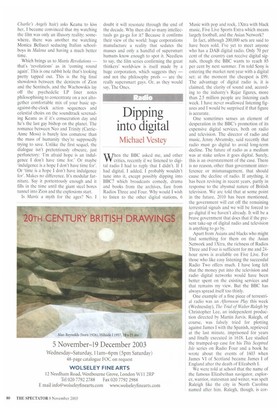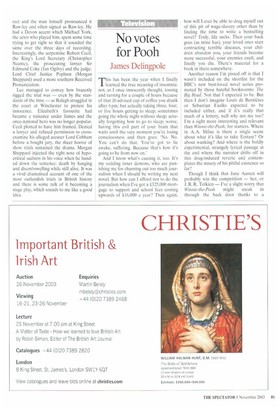Dipping into digital
Michael Vestey
When the BBC asked me, and other critics, recently if we listened to digital radio I had to reply that I didn't, If I had digital, I added, I probably wouldn't tune into it, except possibly dipping into BBC7 which broadcasts comedy, drama and books from the archives, fare from Radios Three and Four. Why would I wish to listen to the other digital stations, 6
Music with pop and rock, 1Xtra with black music, Five Live Sports Extra which means largely football, and the Asian Network?
In fact, although 200,000 sets are said to have been sold, I've yet to meet anyone who has a DAB digital radio. Only 70 per cent of the country can receive digital signals, though the BBC wants to reach 85 per cent by next summer, I'm told Sony is entering the market next year with a digital set; at the moment the cheapest is 199. The advantage of digital radio is, it is claimed, the clarity of sound and, according to the industry's Rajar figures, more than 2.5 million people are listening each week. I have never swallowed listening figures and I would be surprised if that figure is accurate.
One sometimes senses an element of desperation in the BBC's promotion of its expensive digital services, both on radio and television. The director of radio and music, Jenny Abramsky, said recently that radio must go digital to avoid long-term decline. The future of radio as a medium was at stake unless it goes digital. Surely, this is an overstatement of the case. There is no reason, other than government interference or mismanagement, that should cause the decline of radio, If anything, it has been reviving in recent years, partly in response to the abysmal nature of British television. We are told that at some point in the future, 2010 has been mentioned, the government will cut off the remaining terrestrial signals and we will be forced to go digital if we haven't already. It will be a brave government that does that if the present take-up of digital radio and television is anything to go by.
Apart from Asians and blacks who might find something for them on the Asian Network and 1Xtra, the richness of Radios Three and Four is sufficient for me and 24hour news is available on Five Live. For those who like easy listening the successful Radio Two offers much. I have long felt that the money put into the television and radio digital networks would have been better spent on the existing services and that remains my view. But the BBC has always spread itself too thinly.
One example of a fine piece of terrestrial radio was an Afternoon Play this week (Wednesday), The Trial of Walter Ralegh by Christopher Lee, an independent production directed by Martin Jarvis. Ralegh, of course, was falsely tried for plotting against James 1 with the Spanish, reprieved at the last minute, imprisoned for years and finally executed in 1618. Lee studied the trumped-up case for his This Sceptred Isle series on Radio Four and a book he wrote about the events of 1603 when James VI of Scotland became James 1 of England after the death of Elizabeth I.
We were told at school that the name of the famous Elizabethan navigator, explorer, warrior, statesman and writer, was spelt Raleigh like the city in North Carolina named after him. Ralegh, though, is cor rect and the man himself pronounced it Raw-ley and often signed as Raw-ley. He had a Devon accent which Michael York, the actor who played him, spent some time trying to get right so that it sounded the same over the three days of recording. Interestingly, the serpentine Robert Cecil, the King's Lord Secretary (Christopher Neame). the prosecuting lawyer Sir Edmund Coke (Ian Ogilvy) and the judge, Lord Chief Justice Popham (Morgan Sheppard) used a more southern Received Pronunciation.
Lee managed to convey how brazenly rigged the trial was — even by the standards of the time — as Ralegh struggled in the court at Winchester to protest his innocence. Elizabeth's favourite had became a nuisance under James and the once-national hero was no longer popular. Cecil plotted to have him framed. Denied a lawyer and refused permission to crossexamine his alleged accuser Lord Cobham before a bought jury, the sheer horror of show trials sustained the drama. Morgan Sheppard injected the right note of hypocritical sadness in his voice when he handed down the sentence: death by hanging and disembowelling while still alive. It was a vivid dramatised account of one of the most outlandish trials in British history and there is some talk of it becoming a stage play, which sounds to me like a good idea.



































































































 Previous page
Previous page